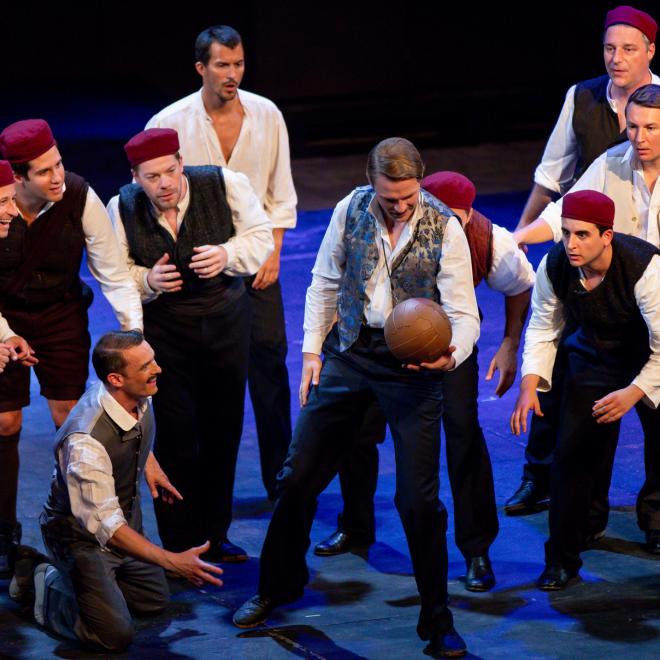
- More
- Performances
- Artists
Zagreb City Theatre Komedija
Miljenko Smoje: VELO MISTO
Premiered on 3 March 2023 in the Komedija Theatre.
Directed and adapted by: Marina Pejnović
Director's assistant: Patrik Sečen
Set designer: Liberta Mišan
Costume designer: Petra Pavičić
Choreographer: Dejan Jakovljević
Composer and sound designer: Vid Adam Hribar
Lighting designer: Elvis Butković
Costume designer's assistant: Eva Karakaš Bedrina
Speech advisor: Joško Ševo
Cast:
Narrator: Vinko Kraljević
Repairman: Damir Lončar
Papundek: Ivan Čuić
Four-eyes: Ognjen Milovanović
Violeta: Vanda Winter
Pegula: Ivan Glowatzky
Duje: Marin Klišmanić
Ana: Dajana Čuljak
Kate: Ana Magud
Tonči: Ivan Magud
Ferata: Filip Juričić
Marjeta: Nera Stipičević
Rico / Policeman: Adnan Prohić
Strikan: Davor Svedružić
Netjak / Countyman / Priest: Goran Malus
Picaferaj / Nino: Saša Buneta
Doc Vice: Željko Duvnjak
Professor / Stojan / Mićo: Zlatko Ožbolt
Granny Marta / Mare Mulica /Marjeta's mother / Duje's mother / Peasant: Jasna Palić Picukarić
In many parts: Komedija Theatre Choir: Aleta Arbanas Rendulić, Kristina Habuš, Dora Masle, Tea Nuić, Irena Raduka, Dino Antonić, Boris Barberić, Dario Došlić, Božidar Peričić, Zoran Simikić and Matija Škovrc
Voice and video narrator: Dražen Bratulić
Although many are familiar with this title from the legendary Croatian TV series, we decided to give it a chance in a new, theatrical reading. Unencumbered by the characters from the series and their famous interpreters, this play by Komedija rushed to the challenge of showing a new Velo misto, told in theatrical language. The main character of the play is the city of Split - but we follow it through the eyes of a whole series of characters, who, although they belong to different political and social contexts, exist in a mental constant. Despite six different governments changing, six different flags (Austro-Hungarian Monarchy, Kingdom of Serbs, Croats, and Slovenes, Kingdom of Yugoslavia, Fascist Italy, Nazi Germany, Socialist Yugoslavia), the city and its people remain the same, they do not let themselves be subdued. The play is mainly set in the year 1936, when the city is ruled by a sense of great disorder and constant change, when it seems to everyone that there will never be a war, and yet everything looks as if it could start at any moment. Through the chaos of pre-war inflation, Russian immigrants, smuggling, emigration of young people to America, queues for food handouts, transfer of Ustasha to Italy and communists to international brigades in Spain; our characters meet in impossible combinations and help each other without any assumption of what will happen in just a few years. That's why we'll laugh, but that's also why our laughter will be tragic. We the audience know exactly which direction our characters are going. Humor that carries life. A play about surviving life itself. Velo misto as an apotheosis to the fact that every politic is a form of oppression of which life is oppositon, a life that refuses to be shaped by it and survives and outlives every political context with and through humor. Because people and their mentality remain, and politics are transient. The city remembers life and life is.
Duration: about 180 minutes; the play has one intermission
Photo (c) Ines Novković
--
- 22. August 2023./ Tuesday / 21:00 Revelin Fort Terrace +Tickets
- 23. August 2023./ Wednesday / 21:00 Revelin Fort Terrace +Tickets
- 24. August 2023./ Thursday / 21:00 Revelin Fort Terrace +Tickets

